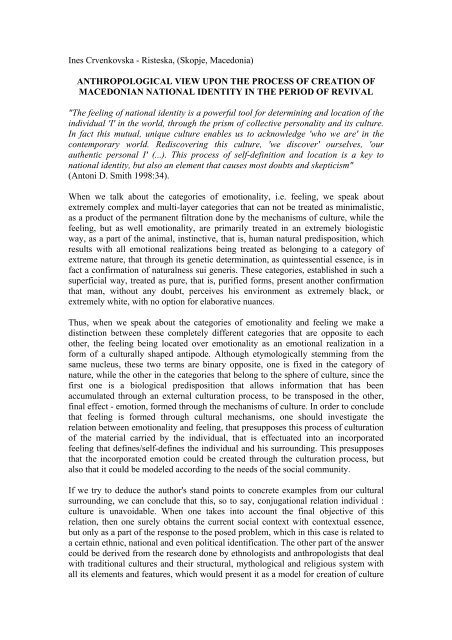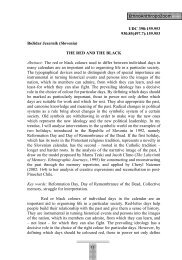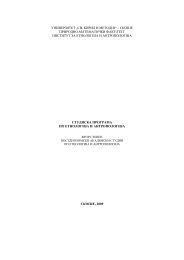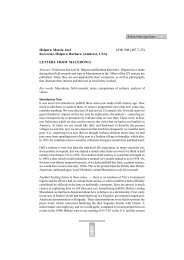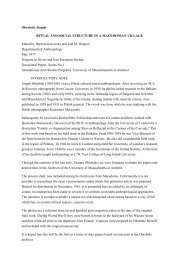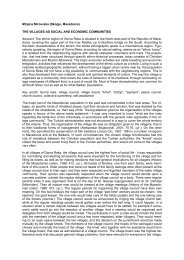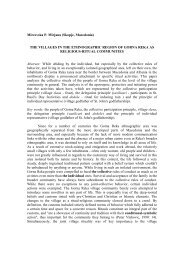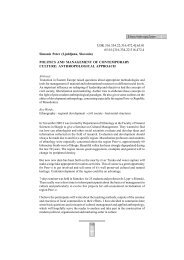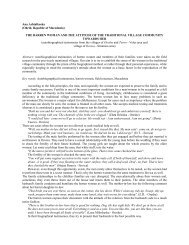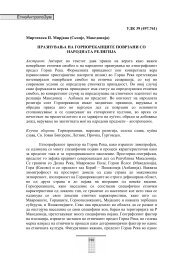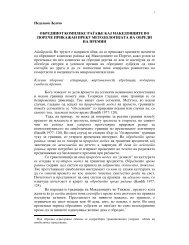Ines Crvenkovska - Risteska, (Skopje, Macedonia ...
Ines Crvenkovska - Risteska, (Skopje, Macedonia ...
Ines Crvenkovska - Risteska, (Skopje, Macedonia ...
Create successful ePaper yourself
Turn your PDF publications into a flip-book with our unique Google optimized e-Paper software.
<strong>Ines</strong> <strong>Crvenkovska</strong> - <strong>Risteska</strong>, (<strong>Skopje</strong>, <strong>Macedonia</strong>)<br />
ANTHROPOLOGICAL VIEW UPON THE PROCESS OF CREATION OF<br />
MACEDONIAN NATIONAL IDENTITY IN THE PERIOD OF REVIVAL<br />
"The feeling of national identity is a powerful tool for determining and location of the<br />
individual 'I' in the world, through the prism of collective personality and its culture.<br />
In fact this mutual, unique culture enables us to acknowledge 'who we are' in the<br />
contemporary world. Rediscovering this culture, 'we discover' ourselves, 'our<br />
authentic personal I' (...). This process of self-definition and location is a key to<br />
national identity, but also an element that causes most doubts and skepticism"<br />
(Antoni D. Smith 1998:34).<br />
When we talk about the categories of emotionality, i.e. feeling, we speak about<br />
extremely complex and multi-layer categories that can not be treated as minimalistic,<br />
as a product of the permanent filtration done by the mechanisms of culture, while the<br />
feeling, but as well emotionality, are primarily treated in an extremely biologistic<br />
way, as a part of the animal, instinctive, that is, human natural predisposition, which<br />
results with all emotional realizations being treated as belonging to a category of<br />
extreme nature, that through its genetic determination, as quintessential essence, is in<br />
fact a confirmation of naturalness sui generis. These categories, established in such a<br />
superficial way, treated as pure, that is, purified forms, present another confirmation<br />
that man, without any doubt, perceives his environment as extremely black, or<br />
extremely white, with no option for elaborative nuances.<br />
Thus, when we speak about the categories of emotionality and feeling we make a<br />
distinction between these completely different categories that are opposite to each<br />
other, the feeling being located over emotionality as an emotional realization in a<br />
form of a culturally shaped antipode. Although etymologically stemming from the<br />
same nucleus, these two terms are binary opposite, one is fixed in the category of<br />
nature, while the other in the categories that belong to the sphere of culture, since the<br />
first one is a biological predisposition that allows information that has been<br />
accumulated through an external culturation process, to be transposed in the other,<br />
final effect - emotion, formed through the mechanisms of culture. In order to conclude<br />
that feeling is formed through cultural mechanisms, one should investigate the<br />
relation between emotionality and feeling, that presupposes this process of culturation<br />
of the material carried by the individual, that is effectuated into an incorporated<br />
feeling that defines/self-defines the individual and his surrounding. This presupposes<br />
that the incorporated emotion could be created through the culturation process, but<br />
also that it could be modeled according to the needs of the social community.<br />
If we try to deduce the author's stand points to concrete examples from our cultural<br />
surrounding, we can conclude that this, so to say, conjugational relation individual :<br />
culture is unavoidable. When one takes into account the final objective of this<br />
relation, then one surely obtains the current social context with contextual essence,<br />
but only as a part of the response to the posed problem, which in this case is related to<br />
a certain ethnic, national and even political identification. The other part of the answer<br />
could be derived from the research done by ethnologists and anthropologists that deal<br />
with traditional cultures and their structural, mythological and religious system with<br />
all its elements and features, which would present it as a model for creation of culture
at the level of ethnicity. A conclusion can be drawn that the traditional mythologicalreligious<br />
system has been raised to a level of an 'ideal' model for creation of an ethnic<br />
political mythological and religious system, with all its components and features<br />
which, according to the semiological concept of Roland Barthes, who treated myth as<br />
a semiological system, as a 'carrier of meaning' (Roland Barthes 1971:263, quoted<br />
according to Pavlovski Mishel 2004:42), are build as an additional semiological<br />
structure upon the ethnic political, mythical story, that has been formed upon an<br />
"ethnic-centered ideal, phantasmagoric axis" (Colovic Ivan, 2000, page 16).<br />
This is how one can explain the 'editorial' tendency of the collectivistic ideas through<br />
concrete cultural and social realizations (states, uprisings, wars and transitions), as<br />
invented 'ideal' expressions related to the management or re-configuration of the<br />
continuous survival of identity communities.<br />
The above quoted sequence of the famous anthropologist Antony D. Smith suggests<br />
that each individual, by definition, never perceives himself as an isolated entity, but as<br />
a part of a certain community, while at the same time establishing and confirming<br />
one's own attainment to a certain identity group and most importantly, one's own<br />
position in that group. Such a cultural catharsis presupposes an existence of an<br />
individual with a developed feeling of identity self-confirmation, that assists the<br />
process of psychological relief when it comes to the questions: 'who am I?', 'where do<br />
I belong?'.<br />
According to many authors, a confirmation of the stand-point that the communities<br />
and the collective individual I have always strived towards defining the sum of<br />
elements that belongs to the sphere of us, is the establishing of community borders in<br />
the sense of B. Anderson's definition, and he is totally right when saying that<br />
"communities should differ not according to their falseness/authenticity, but<br />
according to the style in which they are imagined" (Anderson Benedict 1998:20). The<br />
conclusion of B. Anderson is upgraded with the "desire for separation" (Brumbauer,<br />
Ulf 2002:90) and the creation of "symbolic border around one's own community, that<br />
feels threatened by the bigger ones" (Brumbauer, Ulf 2002:90), manifested in an<br />
organized way, at a number of construction levels.<br />
- From mythology to ethnicity<br />
This research covers a segment of the process of the creation of a <strong>Macedonia</strong>n<br />
national identity, in the period before and after the Ilinden uprising of 1903 in<br />
<strong>Macedonia</strong>, as well as the social context of that time. The analysis of the historical<br />
events in the social context, aims towards confronting the existing subjective attitudes<br />
and abstracting them, and at the second level, but not less importantly, through arrive,<br />
through implementation of adequate methodological techniques and tools, to the<br />
desired non-biased research solutions, that would be another example of the mosaic of<br />
processes of creation of a cultural category of ethnicity, that is nationality in a unit of<br />
time, especially since it refers to an example which is extremely complex and still<br />
current at the international scene. The anthropologic research of the model of<br />
<strong>Macedonia</strong>n national identity done by foreign researchers, have treated it as belonging<br />
to the same group with other Balkan national identities. <strong>Macedonia</strong>n authors did not<br />
do much research on the problem of the <strong>Macedonia</strong>n national identity, most probably<br />
aiming to avoid the danger of falling into the trap of every-day politics, or due to fear<br />
of condemnation by the 'national disciplines' that are still dominant in the scientific
sphere in <strong>Macedonia</strong>. On the other hand, in relation to <strong>Macedonia</strong>n national identity<br />
there is still a realistic opportunity that this analysis can be used as a contra-attack by<br />
the others, that doubt the existence of institutions (the state, the name, the church, the<br />
language), which are important for the public manifestation of the <strong>Macedonia</strong>n<br />
national identity, thus relativizing the legitimacy of the independent state. This is why<br />
such ethnological and anthropological research do not tolerate a daily-politics<br />
approach, that would position the research itself on this or the other side, but it treats<br />
phenomena as they are presented and not in a biased context.<br />
The model of <strong>Macedonia</strong>n national identity, especially the process of its creation,<br />
could serve as an explicit example of an ethnological and anthropological research<br />
related to the problem of ethnicity, as one of the cultural strata in building<br />
distinctiveness, based upon the principle of otherness, that derives from the relation<br />
between the collective us : others.<br />
The attempt for conducting a research concerning <strong>Macedonia</strong>n national identity in a<br />
certain social context and time when the author is doing the research, asks for certain<br />
reconstruction of the historical events and the social context in an established<br />
historical period, events that proved, through time, important for the process of<br />
creation of national identity, and this is the period of 'revival'. This diachronicall<br />
analysis is not sufficient for deriving a complete answer to the posed problem. This<br />
satisfies only the part that is a result of one of the 'basic categories - dispositions of<br />
man and the human nature (...) the need to live in a community' (Risteski Lj.,<br />
2005:67). The representatives of the revival speak about this as 'a national unification<br />
of <strong>Macedonia</strong>n Slavs, and unification of the interests of all <strong>Macedonia</strong>n people' (Krste<br />
P. Misirkov, 2003:68).<br />
To finally satisfy the need of an answer, the rest of it should be derived at a level of<br />
"disposition of creation of communication systems, based upon the process of<br />
symbolical communication (...) where these systems of communication enable(d)<br />
cultural values to be transferred, kept, stored and transmitted from one generation to<br />
another, from one community to the other etc." (White 1970:11, Casirer 1996:47,<br />
quoted according to Risteski Lj., 2005:67). Having in mind that Man is continuously<br />
creating symbolical communication systems, it is assumed that the creation of a<br />
communication system for identification at the level of ethnicity falls under the same<br />
heading. To understand the ethnic-based identity communication system it is<br />
necessary to conduct research upon, as Edmund Leach calls it, communication<br />
behavior that according to him is a "part of the sign system that 'serves the purpose of<br />
transmitting messages', but which is not being based upon mechanical relation<br />
between the tools and the goal, but being based upon a culturally defined<br />
communication code'. (Leach E., 1971:772). Such communication behavior transmits<br />
messages through culturally defined communication systems - codes, that serving the<br />
need of symbolical communication appear as generators for (re)activation of the<br />
stored culturally defined communication knowledge, accumulated through a certain<br />
period of time, also called by different authors collective memory matrix at the level<br />
of ethnicity. The (re)activation of the collective matrix, in the given context, and in a<br />
given unit of time is objectified through the form of ritual activity, ethnic-political<br />
rituals (Dunja Rihtman-Augustin, 2000) and 'festivities' that 'create a whole and give a<br />
rhythm of life' (Dunja Rihtman-Augustin, 2000).
If we start from the conclusion that the myth and mythological way of thinking are<br />
defining categories upon which the complete system of perception and creation of<br />
notions of man and the world is based (Lévi-Strauss 1988:103-236, Lévi-Strauss<br />
1989:202-228, quoted according to Risteski Lj., 2005:67) and the fact that myth<br />
should be considered a basic phenomenon of human culture, or more precisely as the<br />
only relevant system of religiously and socially prescribed behavior of people in a<br />
certain culture' (Risteski Lj., 2005:68), this presupposes that the communication<br />
system that serves the purpose of ethnic identification takes its culturally defined<br />
communication codes from myth and mythological way of thinking. This means that<br />
the ethnic and ethnic-national thoughts and notions are created according to the same<br />
processes that creates mythological and religious system, that has been formed as a<br />
result of mythical logic, mythical way of thinking and mythical notions. Analogous to<br />
the phenomenon of mythical awareness the ethnic-based, that is ethnic-national<br />
awareness, was created. From this one can conclude that everything that falls in the<br />
sphere of the ethnic is organized according to the analogy to the mythical, and as a<br />
result of mythical logic, the structure of the mythical-religious system puts it into a<br />
context, as a part of the structure of the ethnic-based, political, mythical and religious<br />
system. That is, the cultural level of ethnicity, as a relatively new strata in the cultural<br />
communicational symbolic practice, was created according to an analogy to the<br />
relatively older strata, the communication symbolic practice, characteristic for the folk<br />
culture of <strong>Macedonia</strong>ns.<br />
For the needs of this research materials from the period of 'national revival of<br />
<strong>Macedonia</strong>' were used, a period that has been verified by the later official <strong>Macedonia</strong>n<br />
historiography as a period of 'revival', and the authors as 'revival authors', and it refers<br />
to the period before and after the Ilinden uprising (1903). According to the revival<br />
authors, the revival itself is a synonym of what they call 'national separatism' (Krste P.<br />
Misirkov, 2003:154-216), that is a result of the <strong>Macedonia</strong>n nationalistic movement.<br />
Starting from the preposition on the importance of the term revival, being re-born, it<br />
correlates with the idea of the creation of the 'essential', established by the historian of<br />
religious thought, Mircha Eliade, according to whom "it is a matter of a mythical<br />
time, but this is not the 'first', that is, the time that we could call 'cosmogonical' time<br />
(Elijade M., 2002:119). This was reflected in the Golden age myth, the structure of<br />
the pantheon of the folk heroes (demiurgs), as well as the idea that the 'events that<br />
took place in the mythical past deserve to be a subject of knowledge, since learning<br />
them man becomes aware of his essential nature - and he wakes up'. (Elijade M.,<br />
2002;143). In this context, together with the folk notions of folk culture of<br />
<strong>Macedonia</strong>ns, where waking up is closely related to the notions of being born, and the<br />
'open eyes are the most important sign of life' (Risteski Lj., 2005:103), the notions of<br />
national revival, awakening and future survival of the identity community are<br />
embedded, and this is verified by the 'deal' of <strong>Macedonia</strong>n national movement,<br />
"autonomy for <strong>Macedonia</strong>" when the segments of the Golden age myth are being reopened<br />
in the frames of a concrete phenomenon, independent national state.<br />
'(...) "we had the car Alexander the Great". Through these words he remembers the<br />
shiny period and the greatness of the <strong>Macedonia</strong>n state. Alexander the <strong>Macedonia</strong>n<br />
stands in front the <strong>Macedonia</strong>n as a national pride. This national pride today has, for<br />
him, an intellectual importance, concerning the idea of independence. The great<br />
<strong>Macedonia</strong>n state, in the face of Alexander, was extremely useful for science (...)"<br />
(Makedonija, 1888:13-15, quoted according to Ristovski Blaze, 1966:72).
"...<strong>Macedonia</strong>ns! Think about the world hero, the global glory of <strong>Macedonia</strong> - the<br />
great Alexander the <strong>Macedonia</strong>n; think about the courageous car Samuil, the<br />
<strong>Macedonia</strong>n great man, about Krali Marko, the pan-Slavic glory - that they had<br />
<strong>Macedonia</strong>n blood in their veins; they bless and take care of our deed from heavens.<br />
Let's justify the fact that we are their inheritors; let's keep their honored names and<br />
amaze the world with our courage, skill and self-sacrifice..." (Rad makedonskih<br />
komiteta, 1902:2, quoted according to Ristovski Blaze, 1966:164).<br />
Starting from the idea on the 'continuity of the transcendence of the axiological<br />
values' (Elijade M., 2002:148), to further create national identity segments of<br />
mythical reality were activated of which the 'revival authors' thought that they could<br />
serve in the creation of <strong>Macedonia</strong>n national identity. Analogue to mythical thinking,<br />
that 'is presented as a 'concrete' way of thinking in the essential sense of the world:<br />
everything that it embraces experiences a special concretization, merges, and the<br />
mythical notion allows the thing that connects it to finally overlap' (Risteski Lj,<br />
2005:70), the national thought was build, which allows the activated axiological<br />
values, together with the potentially new cultural values to merge and obtain a new<br />
ethnical structural construct. More concretely, there was a process of re-definition of<br />
the existing ethnic political myth and defining of a <strong>Macedonia</strong>n ethnic political myth<br />
upon which the postulates of the <strong>Macedonia</strong>n political mythological and religious<br />
system would be built, in the context of the need of creation and officialization of a<br />
<strong>Macedonia</strong>n national identity, confirmed by independent and sovereign state of<br />
<strong>Macedonia</strong>.<br />
The revival texts, as well as the public communication (articles in the printed media,<br />
official documents, texts on theatre plays etc.) from this period, contain a continuity<br />
of a political mythical story, that did not exist as a separate type of text, but as a<br />
'narrative structure (reservoir of fable), that most often finds its place in certain<br />
literature and folklore forms' (Colovic Ivan, 2000:16), which as a 'highly valued form<br />
of symbolical communication (...) obtains legitimacy as the 'voice of people' (Colovic<br />
Ivan, 2000:16). In the period of revival the texts of the revival authors, but also the<br />
official documents, contain a lot of political folklorisms - events and persons from the<br />
past, that were used to construct, as Colovic puts it taking the phrase from the<br />
structuralists, "an ethnic-centered idea, a phantasmagoric axis" around which the<br />
<strong>Macedonia</strong>n ethnic political myth was formed.<br />
"We rose as supporters of freedom. We serve, spilling our blood through <strong>Macedonia</strong>n<br />
fields and forests, as the <strong>Macedonia</strong>n army of Alexander the <strong>Macedonia</strong>n did, for<br />
freedom, under the motto: 'Freedom or death!" (<strong>Macedonia</strong>n (Kresna) uprising 1878-<br />
1879, Makedonium, 2003:13).<br />
"Our dear motherland <strong>Macedonia</strong> was once one of the most honored countries.<br />
<strong>Macedonia</strong>n people, creating the foundations of military skill, through its victorious<br />
phalanges and through Aristotle's education, has civilized humanity and Asia. But this<br />
once respected motherland of ours today is at the verge of its fall, due to the oblivion<br />
of our origin..." (Manifest of the temporary Government 23 March 1881, 2003:16-17).<br />
- Creation of a national identity aiming to define ethnic distinctiveness<br />
Ulf Brunbauer, in his text Dynamics of ethnicity: Identity of the Pomaks, points out<br />
the conclusions of the authors that deal with identities at the Balkans. According to
them "the region has not passed through the early phases of the formation of national<br />
states" (Brunbauer Ulf 2002:80), that is, that the Balkan national states were formed<br />
relatively late, "at the end of the 19 th and the beginning of the 20 th century"<br />
(Brunbauer Ulf, 2002:80). The creation of the ideal form of manifestation of unity at<br />
the level of ethnicity, defined as a state, according to the revival authors was the only<br />
way of creation of <strong>Macedonia</strong>n national identity. Although during this period some<br />
conditions were created so that the <strong>Macedonia</strong>n national movement could implement<br />
its idea of creation of an independent national state with defined state borders, the<br />
plan remained only at the level of an idea, that was implemented later one. But this<br />
was not an obstacle concerning the process of creation and officialization of the<br />
<strong>Macedonia</strong>n national identity, as if it was imagined by the 'creators'.<br />
The example of the <strong>Macedonia</strong>n national identity is contrary to the idea that in order<br />
to build an identity a creation of a national state is a must, and is the only factor that<br />
has its own creational politics in the process of the formation of a national identity.<br />
On the contrary, the example shows that identity could be created as a result of the<br />
need of a reciprocal balance in the power fight of distinctive identities, initiated by the<br />
pressure of the big or smaller forces at the Balkans, above all Russia, implemented by<br />
the small Balkan states that it formed. This type of pretentious economic, but also<br />
cultural influence is what Benedict Anderson calls 'Russification' (B. Anderson,<br />
1998:126). Russia, using the real basis, the Slavic cultural layer, has tried to impose<br />
the need of Slavic unity at the Balkans, so that it could participate in the continuous<br />
global antagonism towards everything that is non-Slavic. The infiltration of the idea<br />
was enabled through the Slavophil Balkan circles, to impose its national interests and<br />
impose territorial and economic domination at the Balkans. The idea was also<br />
implemented by the Governments of the newly formed Balkan national states that, on<br />
the other hand, under the idea of a pan-Yugo-Slavic unity have supported a<br />
nationalistic attitude. Both variants of interests were directed towards the Turkish<br />
province of <strong>Macedonia</strong>. The areas of <strong>Macedonia</strong> where the neighboring official<br />
nationalism succeeded to survive were called by the revival authors 'spheres of<br />
influence'. The population that was identified with the identity features of the<br />
neighboring national identities and official nationalisms, according to the revival<br />
authors presented a part of the so called 'propaganda'.<br />
"The Serbian propaganda is spread through whole of <strong>Macedonia</strong>, except Kostur, Ser,<br />
Petric, Drama region, i.e. the extreme South and extreme East. In Kostur the Serbs do<br />
not have propaganda, not because they are Serbs from Kostur, but because they are<br />
influenced by the Greek propaganda. Serbia is giving the East of <strong>Macedonia</strong> wholeheartedly<br />
to Bulgaria.<br />
Bulgaria is not less generous in relation to Serbia when it comes to the <strong>Macedonia</strong>n<br />
question: Bulgarians acknowledge the Serbs on the South-East side of Shar mountain,<br />
the rest of <strong>Macedonia</strong> is Bulgarian, according to Bulgaria.<br />
Thus, both propagandas are not questioning only the territory on the South-East of<br />
Shara and parts of the sandzak of Ser, that lies close to the Bulgarian border. South-<br />
East of Shara there are only Serbs and in the sandzak of Ser only Bulgarians (...) The<br />
Bulgarians are even more tolerant: they call the part behind Shara mountain "Old<br />
Serbia'.
But besides those two regions, the rest of <strong>Macedonia</strong> is called Serbian by the Serbs<br />
and Bulgarian by the Bulgarians" (Krste P. Misirkov, 2003: 244).<br />
The process of officialization of the <strong>Macedonia</strong>n nationalism started in a parallel way<br />
through activities that were generally conducted from outside (outside the territory of<br />
<strong>Macedonia</strong>) and less frequently from inside (at the territory of <strong>Macedonia</strong>). Its role<br />
during that period was to be solidly established among the population at the territory<br />
of <strong>Macedonia</strong>, through the media, science, culture, at the same time imposing the<br />
<strong>Macedonia</strong>n question at the international scene. The aim was to discuss and finally<br />
solve the issue related to this part of the Balkan region. An example of proclamation<br />
of this question is the Manifest of VMRO (United) from 1924, where the goal is<br />
defined as follows: "to impose to the European public opinion and to international<br />
diplomacy a solution of the <strong>Macedonia</strong>n question" (Manifest of VMRO United, 6 th of<br />
May 1924, Makedonium, 2003:83).<br />
The emergence of <strong>Macedonia</strong>n national element as an ideological movement<br />
In the first wave of movements for ethnic self-identification representatives of middle<br />
and low classes were mobilized, vernacular politicized culture, in the worlds of A. D.<br />
Smith, through which they tried to provide separation of the communities and its<br />
historical territories from the great empires. <strong>Macedonia</strong>n national movement is in the<br />
context of E.D. Smith's statement, that towards the end of the 19 th and the beginning<br />
of the 20 th century there were a number of national movements at the Middle East. It<br />
involved a number of young intellectuals most of which were educated outside<br />
<strong>Macedonia</strong>. The author Blaze Ristovski, in the book Krste P.Misirkov (1874-1926),<br />
Towards the study of the <strong>Macedonia</strong>n national thought development, wrote that the<br />
young intellectuals were under strong influence of “the Russian scientific thought and<br />
the Russian public, and major steps were made for affirmation of the <strong>Macedonia</strong>n<br />
nationalistic ideas.” (Ristovski Blaze, 1966:73-74). This was a result of the interest<br />
when “the issue of the <strong>Macedonia</strong>n nationality and <strong>Macedonia</strong>n language became<br />
central not only in the relationships between Bulgaria, Serbia and Greece, but also in<br />
the Slavonic.”(Ristovski Blaze, 1966:73-74) B. Ristovski mentions in the book that in<br />
1886 Ivan Ansanov, prominent leader and inspirer of Slavophil movement “induced<br />
the <strong>Macedonia</strong>ns to fight for their national emancipation and to raise their language to<br />
a level of a literature language” (Ristovski Blaze, 1966:73-74) on allegation that the<br />
<strong>Macedonia</strong>n dialect “is richer than the Bulgarian and closer to ours?” (Note. I.C. the<br />
Russian) (Ristovski Blaze, 1966:74) and “will bring us closer together and will bond<br />
us stronger” (Ristovski Blaze, 1966:74). In the same period, the Bulgarian Petar<br />
Draganov “had the possibility to experience the ideals of the <strong>Macedonia</strong>ns, (hence)<br />
from 1887, he began to publish his extensive memoirs “Ethnographical outline on the<br />
Slavic part of <strong>Macedonia</strong>” in the central-Russian magazine for Slavic issues "Izvestija<br />
S.-Peterburgskago Slavjanskago Blagotvoritelnaja Obstestva".(Draganov P.,<br />
1887,1888, quotation according Ristovski Blaze, 1966:74). The author Krste P.<br />
Misirkov writes about the attitudes of the Russian lecturers at the University of St.<br />
Petersburg: "Now there are even scientific representatives as for example Prof. I.A.<br />
Boduen-de-Courtene (Polish professor), P. A. Lavrov (Russian Slavist) and V. Yagic<br />
(Croatian, professor in Russia), that find that <strong>Macedonia</strong>n dialects are separate<br />
representatives of the Slavic language family" (Krste P. Misirkov, 2003). Such a<br />
strong influence contributed to the organization of the <strong>Macedonia</strong>n emigration in<br />
Bulgaria, at the end of the '80ties of the 19 th century, and the <strong>Macedonia</strong>n emigration
in Serbia, in the frames of the so called <strong>Macedonia</strong>n national scientific-literature<br />
associations (Krste P.Misirkov 2003,108-154) among which there was the Slavic-<br />
<strong>Macedonia</strong>n literary association in Sofia, which was organized “with a basic purpose<br />
to revive the folk <strong>Macedonia</strong>n literature”. (Ristovski Blaze, 1966:75).<br />
-Revival national-ideological program:<br />
The interest of the <strong>Macedonia</strong>n revival authors in defining the terms from the area of<br />
ethnicity began at the end of XIXth and the beginning of XXth century. The definition<br />
of the term “nation” can be found in the book “Dictionary of three languages” by<br />
Gjorgija Pulevski published in 1875, where it is written: ‘people who have the same<br />
origin, who speak the same language, who live and associate with each other, and<br />
who have the same customs, songs, and festivities; those people are called a nation,<br />
and the place where these people live is called the fatherland of that people. Thus, the<br />
<strong>Macedonia</strong>ns are a nation, and <strong>Macedonia</strong> is their fatherland (Georgi Pulevski, 2003:<br />
20). The representatives of the revival have tried to define, through the ethnicity<br />
concept of the <strong>Macedonia</strong>n model of national identity, the postulates upon which the<br />
ethnicity concept of the national identity of the <strong>Macedonia</strong>ns would be based. The<br />
representatives of the revival, by mutual acting as representatives of the ideological<br />
movement, at the beginning have realized the need of the self-identification process,<br />
identification among the intelligentsia, and later on among the <strong>Macedonia</strong>n Slavs, for<br />
which a nationalistic - ideological program had been prepared:"The first task of the<br />
<strong>Macedonia</strong>n intelligentsia, then, will be to clear away the mistrust that exists between<br />
the intellectuals and the various national and religious groups and to unite the<br />
intelligentsia both within <strong>Macedonia</strong> and abroad, to assess the general interests of the<br />
<strong>Macedonia</strong>ns by getting down to grass roots, to dispel national and religious hatred,<br />
to educate the <strong>Macedonia</strong>n Slavs in the pure <strong>Macedonia</strong>n national spirit, to make<br />
determined efforts that the <strong>Macedonia</strong>n language is widely taught and to maintain<br />
contact with schools in the towns with a Slav population as well as to teach the<br />
language in village schools attended by Slavs. In the Slav villages they should ensure<br />
that church services are held in <strong>Macedonia</strong>n". (Krste P.Misirkov, 2003: 74)<br />
This could be also seen in the literary opus of the representative of the revival Krste.<br />
P. Misirkov and his role in the <strong>Macedonia</strong>n national movement in the period before<br />
and after the Ilinden uprising in 1903. He based his research upon the <strong>Macedonia</strong>n<br />
national issue, and as a result of his conclusions, he wrote the book “On <strong>Macedonia</strong>n<br />
matters” where he undoubtedly and in a sublimated way summarizes his program<br />
regarding the formation of the <strong>Macedonia</strong>n national identity:<br />
"Through these few words I wanted to explain the content of the proposals directed<br />
towards the <strong>Macedonia</strong>n readers of this book, on certain essential issues. As a<br />
supporter of the idea for a complete separation of our from the interests of other<br />
Balkan nations and for an independent cultural and national development, I wrote<br />
them using the central <strong>Macedonia</strong>n dialect, which for me, from now on, will present a<br />
literary <strong>Macedonia</strong>n language" (Krste P. Misirkov 2003:18).<br />
The relation <strong>Macedonia</strong>ns/others in the book of Krste P. Misirkov "On <strong>Macedonia</strong>n<br />
matters"<br />
-National name:
In his texts Krste P. Misirkov explicitly writes in relation to the national name<br />
of the population in <strong>Macedonia</strong>. He is well aware that the political pressures by the<br />
others could strongly influence the defining of identity of the population, but he is<br />
also aware that national names were imposed, that they were temporary and that they<br />
were changed depending on the success in winning bigger 'spheres of influence' in<br />
<strong>Macedonia</strong>: "If the term 'Serb' would be chased away from <strong>Macedonia</strong>, there would<br />
be only the term 'Bulgarian' referring to <strong>Macedonia</strong>ns, this term being a political and<br />
ethnographic one since the Turkish rule. This term was not bad from a Turkish point<br />
of view, and from the Greek one it was also quite appropriate, since it could be used<br />
to express the despise that the Greeks felt towards us. This is why, among other<br />
things, we proclaimed ourselves to be Bulgarian, i.e. stubborn people" (Krste P.<br />
Misirkov 2003:266). "The Bulgarian name in <strong>Macedonia</strong> is thus a result of the bad<br />
treatment of <strong>Macedonia</strong>n by the Greek clergy. The Greeks have ruined the Ohrid<br />
archbishopric due to the mentioning of the adjective "Bulgarian", as a historical<br />
reliquium, but they have also used the name Bulgarian to express their despise<br />
towards everything Slavic. This is exactly why we call ourselves "Bulgarian" - it is<br />
not due to historical traditions" (Krste P. Misirkov 2003:268)" (...) But this change of<br />
our name is not a unique case. We were called Serbians by the Serbs" (Krste P.<br />
Misirkov 203:252).<br />
Although Misirkov states that “one nation can be without a national name for many<br />
years, if there is no other nation in its vicinity, from which it should be distinguished<br />
by a different national name” (Krste P. Misirkov 2003:115), he is aware of the<br />
problem with the <strong>Macedonia</strong>n national name. The examples show that in the relation<br />
<strong>Macedonia</strong>ns - Greeks, the conformity towards the Slavic community has been<br />
imposed as an identification marker in the Greek perception of the Slavs as<br />
“Bulgarians”, synonym of everything that is Slavic: "The name Bulgarians among the<br />
Slav people was popularized by the Greeks and at first referred only to the<br />
Bulgarians- Mongols (..). However, that name in the eyes and in the utterance of the<br />
Greeks had another special meaning: hated barbarians, people that were uneducated,<br />
rude, resembling the bests. The Greek considered everything that was Slavic as rude<br />
and Bulgarian (Krste P.Misirkov, 2003:252). In the relation between the <strong>Macedonia</strong>n<br />
Slavs and, as Misirkov calls them, the Turks, The <strong>Macedonia</strong>ns were identified (selfidentified)<br />
as “raya” or “kauri”: "If a Turk had asked us what we were, we would<br />
answer that we were “kauri" i.e. non-believers or "raja of the tsar". In other words,<br />
we presented ourselves in such way so we would not make the Turkish officer angry.<br />
In front of the Turks we were "kauri" and "raja", and we began to call ourselves<br />
"kauri" among each other."(Krste P. Misirkov 2003:260) This means that the national<br />
name of the population in <strong>Macedonia</strong> was formed depending on the side with whom it<br />
entered into communication or with whom it had certain relation: <strong>Macedonia</strong>ns :<br />
Bulgarians, <strong>Macedonia</strong>ns : Greeks, <strong>Macedonia</strong>ns : Turks; and usually the<br />
<strong>Macedonia</strong>ns have adjusted their self-identification according to the perception of the<br />
others, from the view point of the other towards the <strong>Macedonia</strong>ns, i.e. they<br />
proclaimed themselves from the position of the defined social status by the other.<br />
"Thus, Turks made us a nation that is 'kaurski or 'rajatski', terms that were based upon<br />
our humility in relation to the Turks, upon the religious difference between us and<br />
them, and upon our social status" (Krste P. Misirkov 2003:262).<br />
This type of self- perception (in respect to the national name), through the perception<br />
of the other, is typical for a population with non-defined ethnical identity, because
such system of identification on the basis of ethnicity is regarded as a relatively newer<br />
cultural communicational system, contrary to the system for social identification<br />
where the individuals in the relations have positioned themselves by determination of<br />
the social status, which was proven as more relevant for the determined norms in the<br />
social living.<br />
-National language<br />
Krste P. Misirkov, in his research, is interested in issues related to the <strong>Macedonia</strong>n<br />
national identity and he knows exactly where to search the idiom that is specific for<br />
certain social group (for the lingual and communicational collective), and which has<br />
double symbolic role: as idiom of group cohesion and as idiom for distinction from<br />
other groups. In this duality, Skiljan determines the collective identity designation of<br />
that social group. (Dubravko Skiljan, 1998:240-241). K. P. Misirkov seeks the<br />
collective identity designation in the <strong>Macedonia</strong>n language, because, as he says:<br />
“Language is the means by which we are enabled to understand the thoughts,<br />
feelings, and desires of others. Language contains individual sounds, signs, or words<br />
for all man's thoughts, feelings, and desires. This is why language is the spiritual<br />
heritage and treasure of a nation through which all the thoughts, feelings, and desires<br />
the people have experienced in the past are unlocked and released through words and<br />
sounds to be handed down as something sacred from one generation to another(--<br />
)Historical and cultural factors have always been influential in forming a literary<br />
language. For this reason we have lately been neglecting to choose the speech of one<br />
of our own regions as the general literary language, and instead we have been<br />
writing and learning in a foreign, neighboring tongue, chiefly Bulgarian. Now,<br />
however, thanks to circumstances, we are taking the dialect of central <strong>Macedonia</strong><br />
(Veles-Prilep-Bitola-Ohrid) as our general literary language (within his words “the<br />
core of the <strong>Macedonia</strong>n language) (--) We have already seen how closely national<br />
interests are bound up with language, and language with the character and spirit of<br />
the nation (Krste P. Misirkov 2003:138-139) (..) Just as in any country there is a<br />
center, which is best situated in the middle of the country, so too in the field of<br />
language there should be a center".(Krste P. Misirkov 2003:132). According to<br />
Misirkov, “the creation of a literary language is a spiritual need, for this would put<br />
an end to the abuse of our interests by the propagandists and would enable us to form<br />
our own literary and academic center so that we would no longer be dependent on<br />
Belgrade and Sofia. This, however, is no easy task, and it can only be accomplished if<br />
the <strong>Macedonia</strong>n of the north will offer his hand to his brother in the south, and if the<br />
<strong>Macedonia</strong>n from the east will do the same to his brother in the west. And their<br />
meeting-place will be around Prilep and Bitola. (Krste P. Misirkov 2003:300)<br />
We can see from the text that Misirkov makes a clear distinction between the groups<br />
that speaks <strong>Macedonia</strong>n folk tongue, which he uses as a marker for identification on<br />
individual level, from the groups that speak foreign, neighboring tongue. This is<br />
supported by the definition of the contemporary authors in the area of public<br />
communication linguistics, according to whom “every type of identity can best be<br />
interpreted as relational value that arises from the relation between the bearers of the<br />
identity and the others whose identity of same type is different. The identities, on<br />
individual and on collective level, are constructed upon the relation I or we towards<br />
others, and for its defining, both sides in this relation are essential, which means that<br />
the identity is not formed solely upon the self-perception of its bearers, nor from the
perception of the differences regarding others, but also from the perception by others.<br />
(Dubravko Skiljan, 1998:235-236)<br />
Krste P. Misirkov realizes the power of language and its actions and he imposes it in<br />
his program as one of the basic markers in the ethnicity identification process.<br />
Beginning from the stand points of the contemporary researches - anthropologists,<br />
who nowadays clearly define the function of the linguistic actions and the way this<br />
function shows its distinctive trait towards other living beings (…), leads to a<br />
conclusion that human language is specifically marked with the notion that except<br />
sign aspect (where certain phenomenon of the externally-linguistic macrocosm are<br />
marked by linguistic signs) it also has symbolic aspect (where the language as a<br />
symbol serves for formation of the marked phenomenon) and these two aspects are<br />
always mutually connected. Therefore, in the public communication domain there are<br />
two areas: communicational and symbolical area: the first includes all members of<br />
certain linguistic community who can produce and understand message of a certain<br />
idiom, as well as all people who find a symbol of their own unity in such idiom. The<br />
symbolical area, is important for observation of the relationship between the language<br />
and the identity where a distinction should be made (even though they are mutually<br />
dependent) between the identity of the language (as one unit within the multitude of<br />
other languages), and the linguistic identity of individuals and linguistic communities<br />
and communicational collectives. The linguistic identity is a dynamical phenomenon,<br />
composed of great number of elements, and it is characterized with constant and<br />
variable relations between us and the others. Krste P. Misirkov is aware of the<br />
<strong>Macedonia</strong>n linguistic identity (by which the communicational space of <strong>Macedonia</strong>n<br />
language is determined), for the purpose of upgrading the symbolical area (and in<br />
such idiom the people to find a symbol of their own unity), strives to define the<br />
identity (for which he uses the term “<strong>Macedonia</strong>n people’s language”) of the<br />
<strong>Macedonia</strong>n language (as one unit in the multitude of other languages) and proposes<br />
“we choose the dialect of central <strong>Macedonia</strong> as general literary language, i.e. Veles-<br />
Prilep-Bitola-Ohrid dialect (within his words “the core of the <strong>Macedonia</strong>n language”),<br />
i.e. the central dialect to be standardized, codified, and raised to a level of a national<br />
language. Thus, it is emphasized “the human ability, by means of language and<br />
speech to construct a world of marked phenomena and simultaneously to include in<br />
the symbolism domain a potentially great number of phenomena created by the<br />
linguistic activity, that immediately after the establishing of the connection between<br />
the communicational and symbolical dimension, at the moment when such<br />
relationship is placed in the public communication space, all possible language<br />
constructions in the analyzes are reduced in one single type that seemed to us the most<br />
relevant for studying the public (Note. I.C. communicational) traffic. According the<br />
assumption that, in the human macrocosm, the language itself is manifested as a<br />
symbol of individual statuses and roles or as individual and collective entities within<br />
the social structure, we can say that in this type of symbolism the language constructs<br />
itself as a symbol, but we should emphasize the fact that here we are taking about a<br />
type of personification, because in the bases of such processes the speakers of the<br />
language can always be recognized, and not the language itself, but also the fact that it<br />
is a matter of some type of “circuit” where the language is the means, but also the<br />
result of the symbolic construction…” (Dubravko Skiljan, 1998:233). If we consider<br />
all of this from a current perspective, it arises as definition that: the nation produces<br />
(national) language, and the language, with its communicational and symbolical
dimension, provides unity of the nation, and with it the nation is “produced”.<br />
(Dubravko Skiljan, 1998:244-245)<br />
In order to attract the attention of the population, especially the attention of the<br />
educated people, Misirkov, when talking about his book on <strong>Macedonia</strong>n folk tongue,<br />
carefully chooses his rhetoric, which is in the spirit of the ethnicity political folklore,<br />
and he often calls upon the forefathers, the people’s spirit, and everything that<br />
according to him is categorized as ‘sacred’, making personification of the language<br />
and the religion into one context, with the impressions related to “the soul”, as<br />
essence for the existence of one nation. This is all for imposing the language and the<br />
religion in his program as the two most important markers in the ethnicity<br />
identification, but also as symbols of identity unity, as part of the ethnicity symbolical<br />
communicational system:"Preserving one's national language and defending it as<br />
something sacred means remaining faithful to the spirit of one's forefathers and<br />
respecting all that they have done for posterity. Renouncing one's national language<br />
means renouncing one's national spirit (...) Through them we were given our first<br />
spiritual nourishment, because they gave meaning to all that we saw with our own<br />
eyes. Through the national language we are brought closer to the way of thinking of<br />
our fathers and forefathers, and we become their spiritual heirs in the same way as -<br />
through our physical strength - we perpetuate them in our body. (...)Religion and<br />
language are the soul of a nation (...)(Krste P. Misirkov 2003:135-136)<br />
We can see from the text that Misirkov assigns double role to language, as part of the<br />
essence or the “soul”, but also as a synonym of the human “naturality” to judge for<br />
himself, on the basis of the acknowledgements about the language that he practices.<br />
According to the author, ethnic communication may be established solely through the<br />
applied ‘spiritual nourishment” - the language of the fathers and mothers, and by<br />
preserving and cherishing the language they can be their spiritual heirs. Thus, the<br />
people’s spirit, through the language as a channel, will be distributed among the<br />
people, so they can become spiritual and bodily heirs of their forefathers, and will<br />
continue their national parentage.<br />
FOREFATHERS →lang. as a channel →authors-repr. of the revival →lang. as a<br />
channel →contemporary 'pure' <strong>Macedonia</strong>ns<br />
(bearers of nation’s soul and religion)<br />
(heirs)<br />
(heirs)<br />
-Religion<br />
Besides the issue of the language, to which Misirkov gives great importance in his<br />
work, the issue of religion is presented as infallible segment in the construction of his<br />
program for formation of the national identity, and he pays great attention to the<br />
religious propaganda, which according to the author, is closely related to the national<br />
propaganda, that have made a huge influence upon the ethnic self-determination and<br />
determination among individuals: "Unfortunately the Orthodox religion - the oldest,<br />
the most widespread, the basic faith of all the nationalities of <strong>Macedonia</strong> - has<br />
completely lost sight of its main aim, which is to encourage brotherhood amongst the<br />
different nationalities (..) Instead of pursuing these noble aims the Orthodox religion<br />
has simply spread discord and envy. (..). The Orthodox faith in <strong>Macedonia</strong> has now<br />
become so compromised that one can no longer speak of a true Orthodox church, for<br />
there are now three churches, and they are not Orthodox but Greek, Bulgarian and
Serbian. (..)If the propounds of religious propaganda try to disrupt the unity of the<br />
<strong>Macedonia</strong>n people and the intelligentsia they will come to see that this is impossible<br />
and that the only choice left to them is to form One Holy Apostolic Church in<br />
<strong>Macedonia</strong>, i.e. to form an Archbishopric in Ohrid which would be the<br />
"Archbishopric of all <strong>Macedonia</strong>".(Krste P.Misirkov 2003:62,64)<br />
According to Misirkov, orthodox Christianity is the 'basic' religion of <strong>Macedonia</strong>ns.<br />
In this way he defines all other religions existing at the territory of <strong>Macedonia</strong> as<br />
potentially marginal concerning the process of building the national identity.<br />
Having in mind the tendency of ethnic determination, as a concrete ethnical and<br />
national definition of the population by the others, the idea was to inspire a process of<br />
nationalization of the older layer of cultural, social and religious autoidentification/identification.<br />
In this way he only orthodox institution, 'the Orthodox<br />
church', as a result of the nationalized religious propaganda, was separated into<br />
institutions with a national character, that continued to exist as carriers of nationalistic<br />
ideas: "One can not talk about one and only Orthodox church, there are 3 churches,<br />
not Orthodox but a Greek, Bulgarian and Serbian one" (Krste P. Misirkov, 2003:62).<br />
This style can be found in the frames of the Orthodox community, where the ethnic<br />
background of an individual was defined according to his belonging to a certain<br />
nationalized religious community: Greeks - "Patrijarhists", Bulgarians - "Egzarhists",<br />
Serbs - "Patrijarshists". The ones that did not belong to Orthodox Christianity, the<br />
Muslims, according to religious the religious affiliation of the ethnic Turks<br />
('Osmanlii') that settled in <strong>Macedonia</strong> were qualified as 'Turks', i.e. the ones that<br />
became Turks - "poturcheni".<br />
Continuously supporting the idea that Orthodoxy should be treated as basic religion in<br />
the creation of national identity, Misirkov sees the solution of the religious issue in<br />
<strong>Macedonia</strong> in the re-institutionalizing of autonomous Ohrid Archbishopric: "If<br />
religious propagandas try to disrupt the unification of <strong>Macedonia</strong>n intellectuals and<br />
<strong>Macedonia</strong>n people, the only solution is to create a unique church, i.e. to establish the<br />
Ohrid Archbishopric as an Archbishopric of the whole of <strong>Macedonia</strong> (Krste P.<br />
Misirkov, 2003:64). This institution would undertake the activities of the religious<br />
institutions with a different national auspice which will lead to creation of an<br />
institution that will affect the ‘national spirit’ of the Slav population through the<br />
mechanisms of ‘people’s enlightening’:“This view upon history of <strong>Macedonia</strong>, it<br />
seems to me, not only shows that we, <strong>Macedonia</strong>ns, have our own history and that we<br />
are a nation, connected through our faith with other neighboring nation, but at the<br />
same time independent and autonomous, as for example the Archbishopric in Ohrid,<br />
with its efforts for national enlightenment. (..)At the same time this historical view<br />
shows that, almost in all times, the strong influence of the national spirit on culturalhistorical<br />
bases can be seen , whose result is formation of strong <strong>Macedonia</strong>n state of<br />
tsar Samuil and rich folk literature”.(Krste P. Misirkov, 2003:280)<br />
Conclusion<br />
The model of <strong>Macedonia</strong>n national identity, especially the process of its creation,<br />
could serve as an explicit example of an ethnological and anthropological research<br />
related to the problem of ethnicity, as one of the cultural strata in building
distinctiveness, based upon the principle of otherness, that derives from the relation<br />
between the collective us : others.<br />
The attempt for conducting a research concerning <strong>Macedonia</strong>n national identity in a<br />
certain social context and time when the author is doing the research, asks for certain<br />
reconstruction of the historical events and the social context in an established<br />
historical period, events that proved, through time, important for the process of<br />
creation of national identity, and this is the period of 'revival'. This diachronicall<br />
analysis is not sufficient for deriving a complete answer to the posed problem. This<br />
satisfies only the part that is a result of one of the 'basic categories - dispositions of<br />
man and the human nature (...) the need to live in a community' (Risteski Lj.,<br />
2005:67). The representatives of the revival speak about this as 'a national unification<br />
of <strong>Macedonia</strong>n Slavs, and unification of the interests of all <strong>Macedonia</strong>n people' (Krste<br />
P. Misirkov, 2003:68).<br />
To finally satisfy the need of an answer, the rest of it should be derived at a level of<br />
"disposition of creation of communication systems, based upon the process of<br />
symbolical communication (...) where these systems of communication enable(d)<br />
cultural values to be transferred, kept, stored and transmitted from one generation to<br />
another, from one community to the other etc." (White 1970:11, Casirer 1996:47,<br />
quoted according to Risteski Lj., 2005:67). Having in mind that Man is continuously<br />
creating symbolical communication systems, it is assumed that the creation of a<br />
communication system for identification at the level of ethnicity falls under the same<br />
heading. To understand the ethnic-based identity communication system it is<br />
necessary to conduct research upon, as Edmund Leach calls it, communication<br />
behavior that according to him is a "part of the sign system that 'serves the purpose of<br />
transmitting messages', but which is not being based upon mechanical relation<br />
between the tools and the goal, but being based upon a culturally defined<br />
communication code'. (Leach E., 1971:772). Such communication behavior transmits<br />
messages through culturally defined communication systems - codes, that serving the<br />
need of symbolical communication appear as generators for (re)activation of the<br />
stored culturally defined communication knowledge, accumulated through a certain<br />
period of time, also called by different authors collective memory matrix at the level<br />
of ethnicity. The (re)activation of the collective matrix, in the given context, and in a<br />
given unit of time is objectified through the form of ritual activity, ethnic-political<br />
rituals (Dunja Rihtman-Augustin, 2000) and 'festivities' that 'create a whole and give a<br />
rhythm of life' (Dunja Rihtman-Augustin, 2000).<br />
If we start from the conclusion that the myth and mythological way of thinking are<br />
defining categories upon which the complete system of perception and creation of<br />
notions of man and the world is based (Lévi-Strauss 1988:103-236, Lévi-Strauss<br />
1989:202-228, quoted according to Risteski Lj., 2005:67) and the fact that myth<br />
should be considered a basic phenomenon of human culture, or more precisely as the<br />
only relevant system of religiously and socially prescribed behavior of people in a<br />
certain culture' (Risteski Lj., 2005:68), this presupposes that the communication<br />
system that serves the purpose of ethnic identification takes its culturally defined<br />
communication codes from myth and mythological way of thinking. This means that<br />
the ethnic and ethnic-national thoughts and notions are created according to the same<br />
processes that creates mythological and religious system, that has been formed as a<br />
result of mythical logic, mythical way of thinking and mythical notions. Analogous to
the phenomenon of mythical awareness the ethnic-based, that is ethnic-national<br />
awareness was created. From this one can conclude that everything that falls in the<br />
sphere of the ethnic is organized according to the analogy to the mythical, and as a<br />
result of mythical logic, the structure of the mythical-religious system puts it into a<br />
context, as a part of the structure of the ethnic-based, political, mythical and religious<br />
system. That is, the cultural level of ethnicity, as a relatively new strata in the cultural<br />
communicational symbolic practice, was created according to an analogy to the<br />
relatively older strata, the communication symbolic practice, characteristic for the folk<br />
culture of <strong>Macedonia</strong>ns.<br />
The interest of the <strong>Macedonia</strong>n revival authors in defining the terms from the area of<br />
ethnicity began at the end of XIXth and the beginning of XXth century. The definition<br />
of the term “nation” can be found in the book “Dictionary of three languages” by<br />
Gjorgija Pulevski published in 1875: ‘people who have the same origin, who speak<br />
the same language, who live and associate with each other, and who have the same<br />
customs, songs, and festivities; those people are called a nation, and the place where<br />
these people live is called the fatherland of that people. Thus, the <strong>Macedonia</strong>ns are a<br />
nation, and <strong>Macedonia</strong> is their fatherland (Georgi Pulevski, 2003: 20). The<br />
representatives of the revival have tried to define, through the ethnicity concept of the<br />
<strong>Macedonia</strong>n model of national identity, the postulates upon which the ethnicity<br />
concept of the national identity of the <strong>Macedonia</strong>ns would be based. The<br />
representatives of the revival, by mutual acting as representatives of the ideological<br />
movement, at the beginning have realized the need of the self-identification process,<br />
identification among the intelligentsia, and later on among the <strong>Macedonia</strong>n Slavs, for<br />
which a nationalistic - ideological program had been prepared:<br />
This could be also seen in the literary opus of the representative of the revival Krste.<br />
P. Misirkov and his role in the <strong>Macedonia</strong>n national movement in the period before<br />
and after the Ilinden uprising in 1903. He based his research upon the <strong>Macedonia</strong>n<br />
national issue, and as a result of his conclusions, he wrote the book “On <strong>Macedonia</strong>n<br />
matters” where he undoubtedly and in a sublimated way summarizes his program<br />
regarding the formation of the <strong>Macedonia</strong>n national identity.
References:<br />
1. Risteski S. Ljupco, Kategoriite prostor i vreme vo narodnata kultura na<br />
Makedoncite, Matica, <strong>Skopje</strong> 2005.<br />
1. Antoni D. Smith, Nacionalni identitet, Biblioteka XX vek, 99, Beograd 1998.<br />
2. Čolovič Ivan, Politika simbola, Biblioteka XX vek, 110, Beograd 2000.<br />
3. Krste P. Misirkov, Za makedonckite raboti, fototipno izdanie po povod 100-<br />
godisninata od izleguvanjeto na knigata, MANU, <strong>Skopje</strong> 2003<br />
4. Benedikt Anderson, Zamisleni zaednici:, razmisluvanja za potekloto i sirenjeto na<br />
nacionalizmot, revidirano izdanie, Kultura, <strong>Skopje</strong> 1998.<br />
5. Brunbauer Ulf, Dinamika na etnicnosta: Identitetot na Pomacite,<br />
EtnoAntropoZum, Spisanie na Zavodot za Etnologija, br.2, <strong>Skopje</strong>, 2002.<br />
6. Bla`e Ristovski, Krste P. Misirkov (1874-1926), Prilog kon proucuvanjeto na<br />
razvitokot na makedonskata nacionalna misla, Kultura-<strong>Skopje</strong> 1966.<br />
7. Dubravko Skiljan, Javni jezik: Pristup lingvistici javne komunikacije, Biblioteka<br />
XX vek, 102, Beograd 1998.<br />
8. Makedonium, Antologija na makedonskata politicka misla, <strong>Skopje</strong>, 2003.<br />
9. Leach E, Kultura i komunikacija, Biblioteka XX vek, Beograd 1971.<br />
10. Elijade Mirca, Aspekti na mitot, Kultura, <strong>Skopje</strong>,2001.<br />
11. Dunja Rihtman-Auguštin, Ulice moga grada, Antropolgija domačeg terena,<br />
Biblioteka XX vek, Beograd 2000.<br />
12. Dirkem Emil, Pravila sociološke metode, Savremena škola, Beograd 1963.<br />
13. Pavlovski Misel, Teatarot i mitot (mitopoetskite elementi vo sovremenata<br />
makedonska dramatika), Knigoizdatelstvo MI-AN, <strong>Skopje</strong> 2004.


